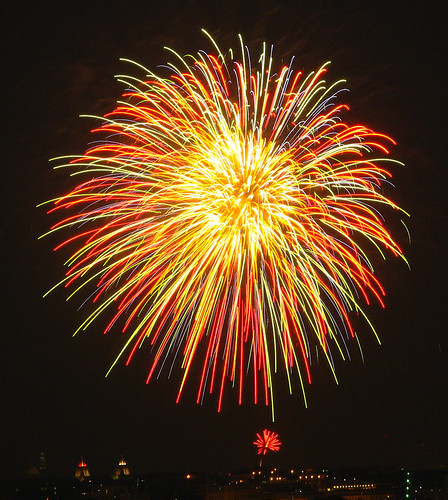Roughly $191 million in fireworks were imported into the United States from China in 2010. We’re willing to bet a majority of those pyrotechnics explode the eve of July 4th, celebrating America’s Independence. But before the skies light up in red, white and blue—the day is packed with parades, barbecues and well, just kicking back to enjoy a national day off. A short three days prior, Canada also celebrates its independence in a similar manner but with a slight twist in Québec. The fanfare is a little more toned down there because it’s also considered “moving day,” the date that’s historically been the end of most lease agreements! (Who can blame them—it’s tough to enjoy a day of unpacking boxes.) Around the world, most countries host a national party to mark their day of independence. (And some even have two such as Latvia, Belize and the Czech Republic.) Though fireworks are pretty common, here’s a look at how some cultures celebrate in unique ways.
Peru: Although July 28th is Peru’s official day of independence, or Fiestas Patrias, Peruvians take two national holidays to celebrate its liberation from the Spanish empire. It’s traditional to play creole music or Andean serenatas in public parks the eve before and then wake to a 21-cannon salute to the raising of the flag at sunrise. The following day, a famous military parade is held in downtown Lima where the President addresses the masses. In other parts of the country, it wouldn’t be a proper celebration without agricultural and cattle fairs. Oh, and one more thing. Cockfighting and bullfighting are not only legal but also very popular in Peru, particularly on Peruvian Independence Day.
India: Just like the Americans (and the South Africans, Afghanis, Fijians, and Nigerians to name just a few), Indians celebrate their liberation from the British. India’s Independence Day takes place on August 15th and in true patriotic style, Indians decorate their streets with flags and buntings in saffron, green and white (the colors of India) a whole month in advance. On the actual day, children attend cultural exhibitions and fly kites high in the sky. But kite flying isn’t just a holiday hobby. It’s an ancient Indian tradition loved by everybody from the rich to the poor—and even the kings.
Switzerland: You may be surprised to learn that Switzerland declared its independence from the Holy Roman Empire all the way back in 1291. Although Swiss National Day is celebrated on August 1st the actual date of independence has been lost in the annals of time. (Though it’s somewhere around the beginning of August.) But what better time to celebrate independence than in the midst of summer when the Swiss illuminate the Rhine Falls near Schaffhausen, light fireworks and gather to sing the national anthem. Although the Swiss have been officially celebrating Swiss Day since 1891 (yes, that‘s 600 years after independence), it’s only since 1994 that they voted to take that day off work!
Independence day around the world reminds us of the struggles endured to secure liberation. While it may not always be a case of this land is your land, this land is my land (rather this land isn’t your land, this land is my land), without doubt Independence Day is a great time for putting our unique national identities first and, above all, celebrating freedom.

